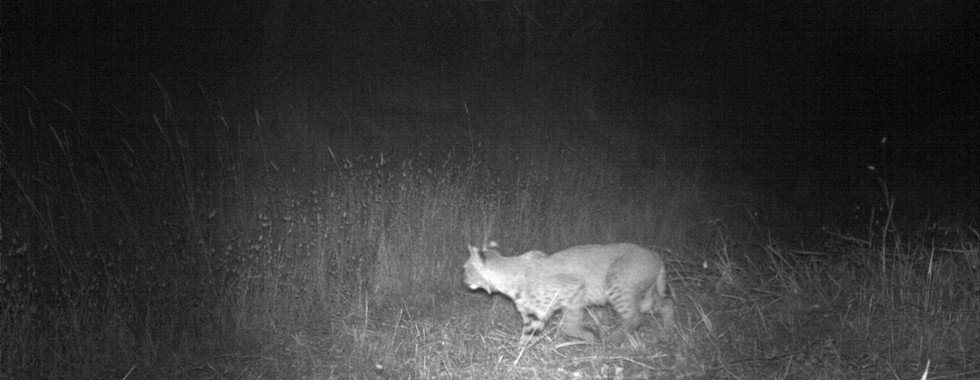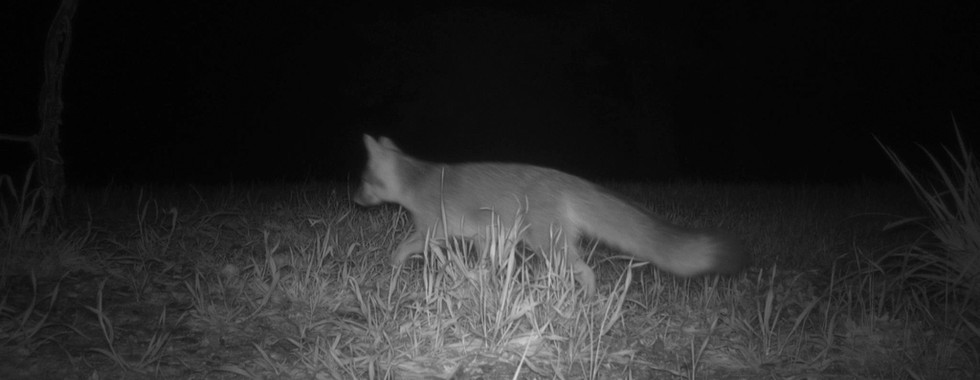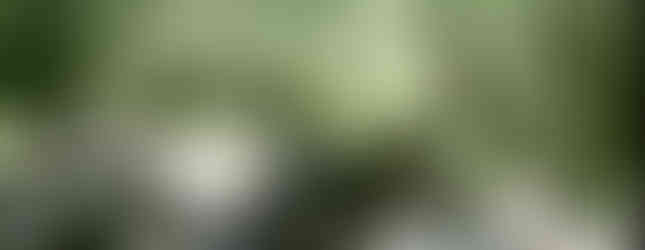Camp Cougar Critter Compendium
- Camp Cougar

- Apr 30, 2025
- 4 min read
Updated: Apr 30, 2025
This compendium lists many of the non-avian critters we've seen. For birds, see Camp Cougar Compendium of Birds.
Blue-tailed Skink
Quick and elusive, the blue-tailed skink flashes its vibrant tail like a streak of electric blue before vanishing into the nearest crevice. At Camp Cougar, it’s most often seen darting from the woodpile, where it finds both shelter and prey. Juveniles are especially vivid, using their bright tails to distract predators — a clever defense in a fast-paced world. Catching a glimpse is rare, but always a thrill.

Bobcat
Bobcats, with their tufted ears and short tails, are smaller cousins of the mountain lion but no less skilled as hunters. They favor the twilight hours, stalking rabbits, woodrats, and birds through thick brush. A glimpse of one is a rare and memorable gift.
California Mountain King Snake
Rare and unmistakable, the California Mountain Kingsnake wears vivid bands of red, black, and white — a warning pattern that mimics the venomous coral snake, though this species is harmless. Secretive by nature, it prefers cool, rocky slopes and dense leaf litter, making sightings at Camp Cougar a special treat. When disturbed, it may coil and hide its head, relying on its bold colors and stealth rather than aggression.

Chipmunk
Chipmunks are not regular residents at Camp Cougar, but one made a brief appearance in the weeks following the 2020 CZU Lightning Complex fire. We believe he may have fled to higher ground to escape the flames, his striped back a flash of movement among the rocks and brush. For a short while, his presence was a reminder of both the resilience of wildlife and the disruption fire brings to the mountain’s rhythm.

Coyote
Coyotes are among the most adaptable creatures of the Santa Cruz Mountains, slipping between forest, meadow, and human settlements with ease. Often seen at dawn or dusk, they are opportunistic hunters, feeding on everything from small rodents to fallen fruit. Their yips and howls once echoed across Camp Cougar, but since the demolition of an old barn — a haven for rodents — in 2019, these clever visitors have sadly disappeared from the land.
Deer
Mule deer drift through the property like ghosts at twilight, grazing on shrubs and grass. Bucks with velveted antlers and does with spotted fawns are familiar sights, though they remain ever alert to the scents and sounds of hidden predators.
Fox
The gray fox is one of our most frequent visitors, especially during the quieter hours of dawn and dusk. With its salt-and-pepper coat, reddish flanks, and black-tipped tail, it blends beautifully into the woodland landscape. Unlike the more common red fox, the gray fox is an agile climber, often seen scrambling up trees to escape danger or search for food.
Gopher Snake
Gopher Snake
The gopher snake is a nonvenomous constrictor that helps keep the rodent population in check. It moves with calm determination, often sunning itself on a warm rock or slipping silently through tall grass. Occasionally spotted at Camp Cougar, this beneficial reptile is a welcome guest — a reminder that not all guardians of the land have fangs or claws.

Great Spangled Fritillary
With shimmering orange wings marked by black spots and silvered undersides, the Great Spangled Fritillary flits gracefully through sunlit clearings at Camp Cougar. It’s especially fond of open meadows and the edges of woodland trails, where native violets — its caterpillar’s host plant — may grow unnoticed. Though fleeting in its visits, the fritillary adds a flash of beauty to warm summer days, a reminder that even brief encounters with wildness can feel like a gift.

Mountain Lion
The elusive mountain lion, or cougar, is the shadow king of the Santa Cruz Mountains. Rarely seen but often present, it roams vast territories, following the deer herds and leaving few signs of its passage. Its presence is a reminder that these hills are still wild at heart.
Opossum
North America’s only marsupial, the opossum, is a quiet and methodical nighttime visitor. With their prehensile tails and opposable thumbs, they climb with surprising skill, scavenging insects, snails, and other small prey. A relatively recent arrival at Camp Cougar, the opossum may have been drawn by the healthy habitat and abundant natural food sources that have grown over time.

Scorpion
Small but formidable, scorpions occasionally emerge from the woodpiles at Camp Cougar. Though rarely seen, these two-inch-long arachnids are well adapted to the dry, rocky environment. By day they hide in cool crevices; by night they prowl for insects and other small prey, moving silently through the darkness. Their presence is a reminder that even the smallest hunters have a place in the ecosystem.

Skunk
Striped skunks waddle confidently through Camp Cougar, secure in the knowledge that few predators wish to tangle with their potent defense. They dig for grubs and insects by night, leaving small conical holes in the soil as evidence of their foraging.
Slug
Bright yellow and unmistakable, the banana slug glides silently across the damp forest floor, recycling fallen leaves and enriching the soil as it goes. Though slow, it plays a vital role in the ecosystem, breaking down decaying matter and spreading spores with every slimy inch. At Camp Cougar, it appears during cool, moist weather — a quiet, gleaming reminder that even the most unassuming creatures have important work to do.

Squirrel
Squirrels are mostly active during the day but are sometimes caught by the camera in the soft light of dawn or dusk. At Camp Cougar, both black and gray tree squirrels scamper through the oaks and firs, gathering seeds and acorns to store for leaner times. Their bursts of energy and acrobatics add a lively spirit to the landscape.

Woodrat
The woodrat, or packrat, is a nocturnal architect, building elaborate stick nests tucked under shrubs or against trees. Fascinated by shiny objects, woodrats sometimes leave curious “trades,” swapping one treasure for another.
















































































































Comments